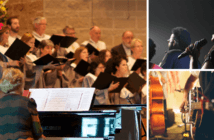Yvonne Gentile and Debi Nixon believe radical hospitality means going beyond mere friendliness to surprise and delight church visitors. Three keys are letting guests know they are noticed, paying attention to their needs, and consistently following up after their visit.
What does exceptional hospitality look like in practice? Radical hospitality is hospitality that goes beyond being friendly; it is welcoming guests with a warmth, openness, and authenticity that significantly exceeds expectations. It is intentional hospitality that surprises and delights people by making them feel noticed, giving them personal attention, and providing excellent follow-through. It is hospitality that makes guests feel so welcome they want to return again and again.
To consistently exceed guests’ expectations, we will likely have to adopt new behaviors — to go out of our comfort zone to make our guests feel comfortable. Radical hospitality creates a feeling of being comfortable, accepted, and valued — a memorable moment that people want to repeat. Friendliness is nice, but it doesn’t really create a feeling that people will remember. Maya Angelou is often attributed with saying that “people will forget what you said, people will forget what you did, but people will never forget how you made them feel.” Guests don’t come back to our churches because of what we do but because of how we make them feel.
The difference between friendliness and radical hospitality is intentionality. To exceed guest expectations on a consistent basis, we have to be very intentional about it. Three principles help us create interactions and environments where guests are open to hearing the message in prayer, song, and sermon and want to come back again. The three principles of radical hospitality are notice, offer personal attention, and provide excellent follow-through.
1. Notice
There is tremendous power in noticing. We cannot provide radical hospitality until we first notice. Everything that follows — all our hospitality efforts — depend on us first noticing. To notice we must be aware of our surroundings (both the physical space and the people around us) and be present in the moment. Noticing includes:
- Offering a warm greeting to each guest you encounter
- Being on the lookout for people and environmental issues that need special attention
- Developing a dependable system for noticing and acknowledging guests
2. Offer personal attention
The second principle of radical hospitality is personal attention, and it’s completely dependent on making space in your life to notice. When guests receive personal attention, it’s memorable. It doesn’t happen often in these days of self-service and screens. How often do you call an organization to get information you need, only to be caught in a never-ending cycle of automated instructions? Have you noticed the trend at retail stores to install self-checkout lines, which mean no interaction with a cashier? As our world gets more and more connected online, it seems we are also more isolated interpersonally. In their book, The Power of Moments, Chip and Dan Heath quote service expert Leonard Berry: “To exceed customer expectations and create a memorable experience, you need the behavioral and interpersonal parts of the service. You need the element of pleasant surprise. And that comes when human beings interact.”
People come to church and expect one of two things: to be smothered by overzealous church people, or to be just another face in the crowd. When we take the time to make them feel seen and heard as individuals, we surprise and delight them. We show personal attention in many ways, including:
- Introducing yourself and learning people’s names
- Wearing name tags and other identifying markers
- Practicing the 10-foot rule and the 3-minute rule (Take responsibility for greeting those seated or standing within 10 feet of you and spend at least 3 minutes before and after any other church activity talking to someone you don’t know very well.)
- Introducing the people you meet to others
- Looking for opportunities to go the extra mile
- Anticipating and fulfilling guests’ needs
These are simple practices, but they have the power to make guests feel noticed and seen through personal attentions.
3. Provide excellent follow-through
The final principle is excellent follow-through, and this one encompasses everything that happens after that first encounter with a guest or after we first notice an issue in our environment or facilities. John Maxwell is quoted about the impact of excellent follow-through in this way: “Diligent follow-up and follow-through will set you apart from the crowd and communicate excellence.”
First, establish a reliable method to identify who your guests are and how many times they have visited, if you don’t have one already. Some churches have a designated location for guests to come and interact with staff or volunteers, and some even encourage them to do so by offering a gift if they stop by. Other churches use connect cards that they ask guests (and sometimes regulars) to complete during worship and turn in later so they can capture the needed information.
When you have collected a guest’s contact information, you can reach out to them for follow-up. Determine what your milestones will be and the goal for each contact. With what frequency and for what duration of time will you follow-up with guests? What is your desired outcome for each contact? Will you reach out every time they visit until they become members, only on their first three visits, or with some other frequency. For how long a time span?
When we live into the principles of radical hospitality, we give people a taste of the kingdom of God. By showing that we are anticipating and ready for guests, that they are welcomed and accepted, we become physical manifestations of Christ’s love and welcome for those who come. When we make their experience exceptionally positive, their preconceived notions about church (and Christians) are deconstructed. They’re open to returning, which is the first step in a life of faith. When hospitality is done well, it changes lives.
 This material is excerpted from The Art of Hospitality (Abingdon Press, 2020) by Yvonne Gentile and Debi Nixon. Used by permission. The book is available at Abingdon Press, Cokesbury, and Amazon.
This material is excerpted from The Art of Hospitality (Abingdon Press, 2020) by Yvonne Gentile and Debi Nixon. Used by permission. The book is available at Abingdon Press, Cokesbury, and Amazon.
Related Resources
- “The Art of Hospitality,” a Leading Ideas Talks podcast episode featuring Debi Nixon
- The Art of Hospitality featuring Debi Nixon — Leading Ideas Talks podcast episode | Podcast transcript
- Be the Welcoming Church, a Lewis Center video tool kit resource
- 3 Characteristics of Genuine Christian Hospitality by Philip J. Brooks






